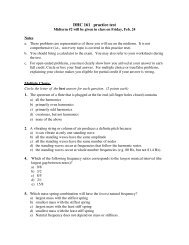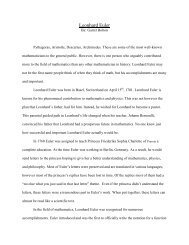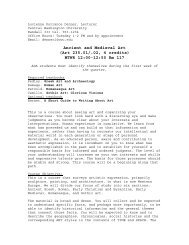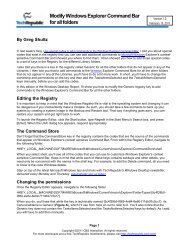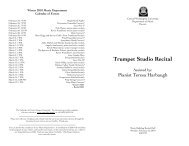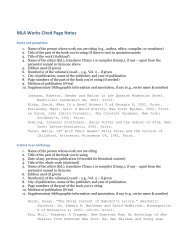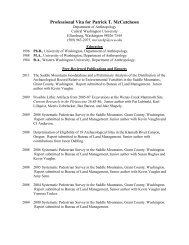THE COURAGE OF TURTLES - Central Washington University
THE COURAGE OF TURTLES - Central Washington University
THE COURAGE OF TURTLES - Central Washington University
Create successful ePaper yourself
Turn your PDF publications into a flip-book with our unique Google optimized e-Paper software.
Hoagland 2<br />
within a matter of days. Their footsteps in the dry leaves gave them away as they<br />
wandered forlornly. The snappers and the little musk turtles, neither of whom leave the<br />
water except once a year to lay their eggs, dug into the drying mud for another siege of<br />
hot weather, which they were accustomed to doing whenever the pond got low. But this<br />
time it was low for good; the mud baked over them and slowly entombed them. As for<br />
the ducks, I couldn't stroll in the woods and not feel guilty, because they were crouched<br />
beside every stagnant pothole, or were slinking between the bushes with their heads<br />
tucked into their shoulders so that I wouldn't see them. If they decided I had, they beat<br />
their way up through the screen of trees, striking their wings dangerously, and wheeled<br />
about with that headlong, magnificent velocity to locate another poor puddle.<br />
I used to catch possums and black snakes as well as turtles, and I kept dogs and<br />
goats. Some summers I worked in a menagerie with the big personalities of the animal<br />
kingdom, like elephants and rhinoceroses. I was twenty before these enthusiasms began<br />
to wane, and it was then that I picked turtles as the particular animal I wanted to keep<br />
in touch with. I was allergic to fur, for one thing, and turtles need minimal care and not<br />
much in the way of quarters. They're personable beasts. They see the same colors we do<br />
and they seem to see just as well, as one discovers in trying to sneak up on them. In the<br />
laboratory they unravel the twists of a maze with the hot-blooded rapidity of a mammal.<br />
Though they can't run as fast as a rat, they improve on their errors just as quickly,<br />
pausing at each crossroads to look left and right. And they rock rhythmically in place, as<br />
we often do, although they are hatched from eggs, not the womb. (A common<br />
explanation psychologists give for our pleasure in rocking quietly is that it recapitulates<br />
our mother's heartbeat in utero.)<br />
Snakes, by contrast, are dryly silent and priapic. They are smooth movers,<br />
legalistic, unblinking, and they afford the humor which the humorless do. But they<br />
make challenging captives; sometimes they don't eat for months on a point of order—if<br />
the light isn't right, for instance. Alligators are sticklers too. They're like warhorses, or<br />
German shepherds, and with their bar-shaped, vertical pupils adding emphasis, they<br />
have the idee fixe of eating, eating, even when they choose to refuse all food and<br />
stubbornly die. They delight in tossing a salamander up towards the sky and grabbing<br />
him in their long mouths as he comes down. They're so eager that they get the jitters,<br />
and they're too much of a proposition for a casual aquarium like mine. Frogs are<br />
depressingly defenseless: that moist, extensive back, with the bones almost sticking<br />
through. Hold a frog and you're holding a skeleton. Frogs' tasty legs are the staff of life<br />
to many animals—herons, raccoons, ribbon snakes—though they themselves are hard to<br />
feed. It's not an enviable role to be the staff of life, and after frogs you descend down the<br />
evolutionary ladder a big step to fish.






